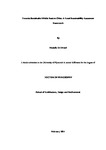Towards Sustainable Middle Eastern Cities: A Local Sustainability Assessment Framework
| dc.contributor.supervisor | Goodhew, Steve | |
| dc.contributor.author | AL-ALwani, Mustafa | |
| dc.contributor.other | Faculty of Arts, Humanities and Business | en_US |
| dc.date.accessioned | 2014-05-13T14:10:41Z | |
| dc.date.available | 2014-05-13T14:10:41Z | |
| dc.date.issued | 2014 | |
| dc.identifier | 10242513 | en_US |
| dc.identifier.uri | http://hdl.handle.net/10026.1/3010 | |
| dc.description.abstract |
The construction of a guiding methodological framework for local sustainability assessment is a key to achieving a sustainable future. This study develops an approach to local sustainability assessment (ALSA), a methodological framework that facilitates the formulation, selection and prioritisation of key indicators to guide the assessment of city sustainability at a local level in Middle Eastern cities. Based on a literature review, this research devised a methodological framework, ALSA, which is a combination of the Commission on Sustainable Development’s (CSD)Theme Indicator Framework (2001) (themes, sub themes and indicators) and a Goal-Based Framework (indicators that most directly reflect the issues of a case study and its local communities and stakeholders). This combination framework is shown to be more appropriate in this instance than other types of frameworks, in terms of overcoming some inherent weaknesses, leading to the adoption of a top-down / bottom-up approach. Such an approach is shown to be the best way of developing indicators which are (top-down) scientifically valid and generic with (bottom-up) stakeholder and local communities needs. The ALSA methodological framework involves four steps, which are: issue identification, objective formulation, indicator formulation and indicator selecting and ranking. The first set of proposed indicators contained 98 indicators. This set of proposed indicators was revised and analysed by means of a series of shared ideas from literature and through consultation with experts from specific areas, using a workshop format. This revision stage was used to reformulate and select valid and useful indicators (comparable, measurable, and sensitive). The second set of valid and useful indicators (after the first revisions) contains 57 indicators. The indicators were ranked on the basis of priority to identify a final set of indicators that cover the four dimensions of sustainability, which are defined within this work as environmental, social, economic and institutional. The evaluation (SWOT analysis) of this framework was examined during this study. The city of Hilla, Iraq, was selected as a case study to prove the applicability of the ALSA methodological framework in a real world case study. It is argued that this study is pioneering in adding knowledge and understanding of the development of a methodological framework to provide local sustainability indicators in a post-conflict, Middle Eastern city in an oil-rich country. It is concluded that the ALSA methodological framework provides an efficient and rigorous approach for the formulation, selection and prioritization of key indicators that will measure and encapsulate the essence of a sustainable city and could help Middle Eastern cities achieve higher levels of progress towards sustainability in practice. | en_US |
| dc.description.sponsorship | Self funding | en_US |
| dc.language.iso | en | en_US |
| dc.publisher | Plymouth University | en_US |
| dc.subject | Sustainability Assessment | en_US |
| dc.subject | Middle Eastern Cities | en_US |
| dc.title | Towards Sustainable Middle Eastern Cities: A Local Sustainability Assessment Framework | en_US |
| dc.type | Thesis | |
| plymouth.version | Full version | en_US |
| dc.identifier.doi | http://dx.doi.org/10.24382/3288 |
Files in this item
This item appears in the following Collection(s)
-
01 Research Theses Main Collection
Research Theses Main


